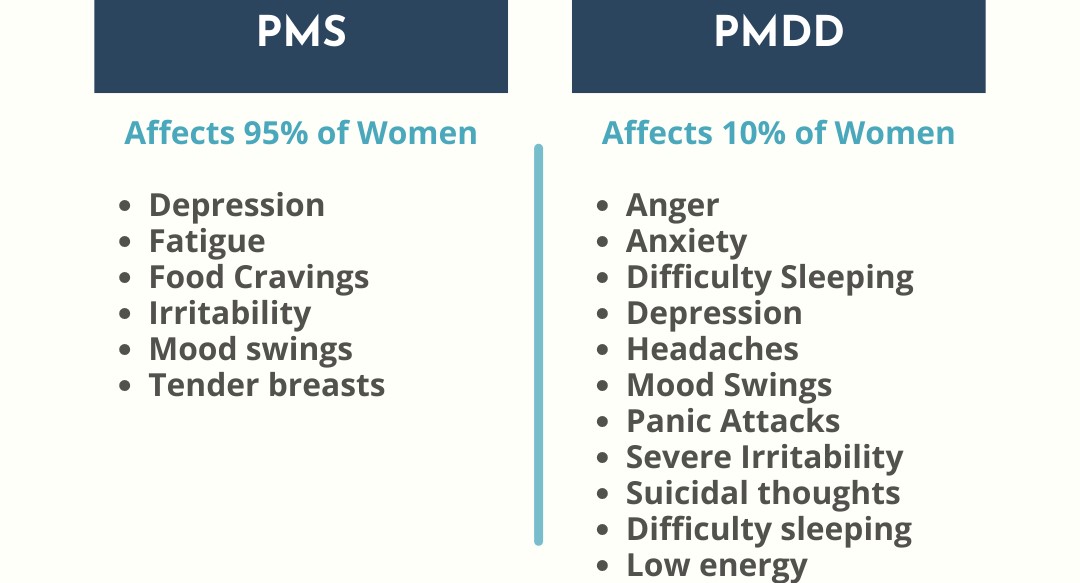Do you often feel sad or fatigued for no apparent reason during your period?
There’s nothing that you need to worry about. It’s just your period hormones doing their thing.
In a sense, feeling mildly irritated during your period is quite normal and, rest assured, it won’t last more than a few days!

However, if you’re feeling depressed or seriously fatigued, it could be due to Premenstrual Syndrome (PMS) or Premenstrual Dysphoric Disorder (PMDD).
There’s no need to panic, though!
These are essentially the same disorder used to explain the hormonal and mood changes that occur during mensuration, except that PMS is slightly milder than PMDD. And since up to 95% of women experience symptoms of PMS, it’s a completely normal phenomenon to deal with.
So, what causes these mood swings, and when does it become a problem?
Read on to learn more about these disorders, how they affect your hormones and what you can do to manage your period more effectively.

What Causes the Mensuration Blues?
You must be wondering why mensural stress happens? After all, mensuration is a normal biological process, so why does it make you feel depressed, sad, and moody?
The simple answer is that mensuration causes hormonal imbalances, resulting in mood swings, lack of concentration, and other physical symptoms.
The culprits: Dopamine and Estrogen.
These are the two influential hormonal chemicals that get altered before, during, and after mensuration. A sudden drop in dopamine may cause depression-like symptoms and sadness, commonly referred to as the “mensuration blues.” A decrease in estrogen levels may cause fatigue and result in a lack of concentration or boredom.
Studies on hormonal changes show that they are a natural part of mensuration, so there’s nothing you can do to prevent them. However, you can manage and cope with extreme feelings of sadness while you embrace womanhood to its entirety.
How to Cope with Mensuration Side-Effects?
There are many factors, such as genetics that determine how much the side effects of mensuration impact your lifestyle. However, if you’re feeling moody or depressed, there are ways to manage these symptoms until your period is over.
Here are some tips to help you deal better with sadness during that time of the month:
-
Exercise Regularly for Mental Clarity
Getting regular exercise is the best way to lift your mood and relieve stress during your period. Try to do home cardio workouts, go for a walk, or do yoga stretching. Avoid heavy exercise as this may make you tired and grumpy.
-
Keep Your Cravings Under Control
Are you one of those people who get cravings when anxious or stressed? If yes, menstruation blues can hinder with your diet plan.
Avoid reaching for a packet of crisps or your favorite chocolates every time you get a craving. Instead, snack on healthy foods such as fruits, vegetables, and nuts. Nuts, in particular, are great since they contain essential vitamins and natural oils that may improve your mood.
-
Target 7-8 Hours of Sleep Every Night
It’s normal to struggle with sleep when you’re stressed out. If you can’t sleep because of uneasiness, then there’s no need to worry.
According to research, hormonal changes may affect stage 2 sleep. This results in uneasiness and may cause you to feel tired and lazy throughout the day. Try to get at least 8 hours of sleep every night to manage your frustration and stress during the day.
If you feel too uncomfortable to sleep peacefully during these days, buy Essentials sanitary pads to stay dry all night long.
-
Meditate
Anyone who’s meditated before knows how peaceful and relaxing it can be. You don’t need to do yoga or take fancy meditation classes to get it right. Simply close your eyes for a few minutes in a quiet room and free your mind from external thoughts.
Meditation is a great way to feel relaxed, energetic, and peaceful.

-
Socialization Always Helps (Even If You’re an Introvert!)
Did you know that socialization and sharing your experiences with others are great ways to reduce stress? Talk to someone close to you about the challenges you’re facing in life or visit a therapist if you’re worried that you have depression.
When To Seek Medical Help?
Menstrual blues usually only last a few days to 1 week at most. Once you get to know yourself better and start coping with the side effects of menstruation, you’ll be able to live your life to the fullest.
However, you’ll need to see a doctor in some cases, especially if the symptoms are severe and you’re finding it difficult to carry out daily routine tasks.
Mensuration may be pretty normal for some women and highly unpleasant for others. Your experience may also vary from month to month and depending on your age.
However, you can always manage the symptoms by following healthy lifestyle practices and getting in touch with a gynecologist whenever needed.







